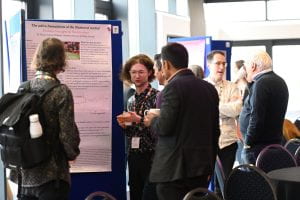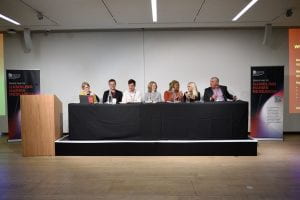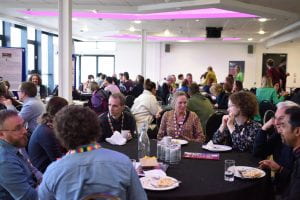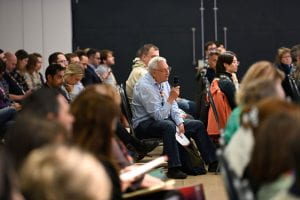By Billy Greville, PhD Researcher at University of Bristol Business School
As I approached the M SHED museum, the impressive event space located in one of Bristol’s key cultural harbourside landmarks, I was reflecting on the colloquium’s theme this year: Building capacity in gambling harms research. As a 2nd year PhD researcher this seemed to not only capture the sentiment of my own journey over the past 12 months, but also the journey we are all on, as those who are pushing hardest to prevent and reduce gambling harms.
To build capacity sounded like a rallying cry; an opportunity to sharpen our conceptual and empirical tools, and hear directly from those with lived experience, campaigners, regulators and policymakers — all of whom are needed to effectively address the challenges emerging from a global gambling industry estimated to reach over $1 Trillion by 2030.
The whole is more than the sum of its parts…
Capacity building by silos would soon fail, however. So, the key premise of the colloquium was to bring together, both online and in person, a diverse mix of expertise from across the world — including governmental representatives, research experts and those with lived experience — to discuss ways of tackling gambling harms. The holistic approach provided what felt to me like a credible foundation on what is often the wide-reaching yet slippery grounds of gambling, requiring interdisciplinary knowledge and often transdisciplinary solutions.
The morning welcome speech by Co-chairs of the Hub, Sharon Collard and Agnes Nairn, echoed this, emphasising the importance of encouraging new kinds of people and perspectives to work with the Hub, as it continues its mission to raise awareness of gambling harms, strengthen consumer protection, and enhance support and treatment.
The day included a lively poster session, with over 20 researchers showcasing their work, and centred around four thought-provoking keynotes and panel speaker sessions, each anchored within one of the key research challenges of the Hub.

Session 1: Perceptions, Motivations, Decisions: What initiates gambling harms?
Lord Foster, long-time gambling reform campaigner and sitting House of Lords member, kicked things off with an impassioned keynote speech, pointing out that regulation needs continuous reform. He discussed some limitations of the White Paper, lacking proper restrictions on gambling products and marketing and advertising, especially sports betting. He also reiterated his belief that in a smartphone era gambling must now be treated as a public health issue.
Not surprisingly, advertising featured prominently in the panel session. University of Bristol’s Michael Banissy discussed how advertising and other cues in our environment play on specific networks in the brain, increasing the possibility of gambling harms.
Andy Taylor, from the Committee of Advertising Practice, offered insight into the restrictions they face as a downstream regulator, advising researchers wishing to collaborate to align projects within their regulatory scope.
Ghent University’s Steffi De Jans brought a fascinating case study to the session, talking about the implications on the recent ban of gambling advertising in Belgium. I wondered how much Belgium’s cultural morality played into this success, perhaps encouraging more political will as voters’ values may have aligned with a ban, and what this might mean in a UK context.
Another interesting topic that emerged was product design. Guy Bray from GamCare spoke about how advertising pulls young gamblers in, however it’s an app that traps them in a state of play. I thought about how this contrasts with advertising regulation. Addiction by design in a risky context such as gambling is highly problematic, yet, to me, seems to get less regulatory emphasis.
Session 2: Narratives, Practice, Representation: What is the everyday practice and portrayal of gambling in social groups?

During this session, the voices of those with lived experience of gambling harms came through strongly. Peter and Steph Shilton’s keynote speech demonstrated the secretive nature of gambling, and the extensive lengths people can go to hide it from their loved ones. Steph also highlighted the challenges loved ones face as “silent victims”, often overlooked for treatment and support.
This was echoed by BetKnowMore UK’s Liz Riley, who highlighted the issues women face as affected others, often carrying the extra burden of financial responsibility, feelings of Isolation and shame, or even coerced into keeping gambling secrets from other family and friends.
Wendy Knight, from GLEN, powerful reading of the poem, “I am Addiction”, authored by an anonymous writer, further brought me viscerally into the world of somebody suffering from gambling harms. I recommend anybody working in gambling harms research to read it also.
Another important theme of this session was the evolving nature of gambling, its craftiness in finding new gamblers through emerging contexts.
University of Bremen’s Tobias Hayer discussed the growth of sports betting in Germany; it’s portrayal by advertising as low-risk and harmless, just a new type of fan activity, helping create social norms linking gambling to supporting your team.
Sam Kirwan, from the University of Bristol, discussed how unregulated crypto assets are a new form of investing practice but moulded in the shape of gambling. What I found particularly interesting was how young people, often described as being worse off than previous generations, were lured into using cryptocurrencies as a hope device for longer term life goals such as buying a house. The similarity to gambling struck me, how in recessionary times gambling is often highest amongst people who face the most severe financial problems.

Session 3: Experience, Risk, Harm. What social and special inequalities exacerbate gambling harms?
Gambling harms can play out and affect groups of people and places differently. As the Guardian’s Rob Davies discussed in his keynote, the clustering of betting shops in less affluent areas target communities and embed gambling harms. This session also pointedly demonstrated the need to consider other marginalised or overlooked groups.
Bournemouth University’s Reece Bush-Evans talked about how marginalised groups such as the LGBTQIA+ community can suffer more or in unexpected ways from gambling harms. Bristol University’s Jo Large also discussed the hidden harms of betting shop employees; how they felt unqualified to handle the levels of problematic behaviour they witnessed daily and felt a burden was placed on them to enforce regulatory rules.
All different examples yet display brilliantly how we must continue to understand the full ecology of gambling harms.
Linking to this, Lee Kah Wee, from the National University of Singapore, brought another unique perspective to the session. He talked about how casinos in Singapore use public transport infrastructure as a form of advertising, targeting customers with a private bus service, bringing the casino to the doors of locals and high-net-worth tourists. Ultimately, they act like mobile advertising, providing a brand experience of luxury. He finished his talk by posing a question: Are casinos exporting harms beyond their buildings?
This occupied my thoughts during the afternoon coffee break. If we consider gambling as a public health issue, as Public Health England suggests, could we create a powerful narrative by framing all PR, sponsorship, marketing or advertising as examples of operators exporting gambling harms beyond their sites?

Session 4: Innovations, Transition, Change: What socio-technical innovations can help combat gambling harms?
The gambling industry is highly innovative, driving profits by leveraging data and new technology while employing the best talent. This informative session showcased how we must continually seek out our own innovations, to both understand and effectively make use of emerging technology and big data to combat gambling harms. The speakers all provided compelling ideas on this call to action.
In her keynote speech, Carolyn Harris, Labour MP for Swansea East, stated that gambling is now firmly on the political agenda. She spoke about how machines are dictating our lives more than ever, and how the impacts of the first iPhone and the gambling act, both from 2007, has transformed gambling into what it is today.
Jamie Wheaton, from University of Bristol, provided an excellent overview of the status of socio-technical innovations in the gambling industry today. Chris May, from Mayden Health tech, discussed how a data-driven approach can be used to help with prevention and treatment, offering bespoke services for gamblers. From the Behavioural Insights Team, Ruth Persian spoke about their Activity Statement research in Australia and how having personal statistics on gambling usage made a big difference to people, empowering more informed financial decisions. I found Clean Up Gambling’s Matt Zarb-Cousin’s idea of gamifying recovery particularly interesting. His notion of using technology to maximise recovery, not profit, seemed like a perfect mantra for this session, inverting the traditional tech model.

The end yet just the beginning
This year’s inaugural colloquium created a rich and lively environment facilitating a cross-pollination of ideas amongst a fantastic intersection of people, all passionate about reforming the gambling industry. I walked away knowing much more about the broad challenges faced yet, perhaps more importantly, inspired by the growing body of expertise on display and a steadfastness to continue working hard on my own research. I look forward to carrying on the conversations at next year’s event.

